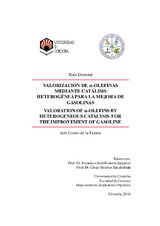Valorización de α-Ólefinas mediante catálisis heterogénea para la mejora de gasolinas
Valoration of α-Olefins by heterogeneous catalysis for the improvement of gasoline
Autor
Coleto de la Fuente, Inés
Director/es
Romero-Salguero, F.J.Jiménez-Sanchidrián, César
Editor
Universidad de Córdoba, UCOPressFecha
2016Materia
GasolinasMejora
Catálisis heterogénea
α-olefinas
Catalizadores
METS:
Mostrar el registro METSPREMIS:
Mostrar el registro PREMISMetadatos
Mostrar el registro completo del ítemResumen
Los requerimientos para obtener gasolinas limpias, al tiempo que
mantener su octanaje, han conducido a las empresas de refinación a producir
gasolinas reformuladas con los componentes adecuados. Sin embargo, la
mayoría de ellos causan importantes problemas ambientales [1]. Así, el
contenido de compuestos aromáticos se limita al 25 % en volumen de los
compuestos oxigenados al 2,7% en peso de oxígeno y el de las olefinas al 18 %
en volumen [2].
La presencia de olefinas en la mezcla de gasolina puede conducir a la
formación de depósitos y gomas, así como a un aumento en la presión de vapor
de la gasolina y de las emisiones de hidrocarburos formadores de ozono. Sin
embargo, el contenido de olefinas (en particular, pentenos y hexenos) en naftas
de FCC está por encima del 40% en volumen, siendo el de las olefinas lineales
más del 30% en esta fracción. En consecuencia, la búsqueda de procesos
industriales para aumentar el valor de estas olefinas ha atraído recientemente un
gran interés. Específicamente, la transformación de olefinas terminales y
lineales en olefinas internas y ramificadas es, sin duda, ventajosa para su uso en
gasolinas reformuladas y como productos químicos intermedios. Estas últimas
olefinas muestran mayor octanaje y menor presión de vapor Reid.
Las olefinas pueden sufrir varias reacciones en un catalizador, tales
como hidrogenación, craqueo, oligomerización, ciclación, isomerización de... The requirements to meet clean gasolines while maintaining their octane
have leaded refining companies to produce reformulated gasolines with suitable
components. Nevertheless, most of them cause important environmental
problems [1]. Thus, the content of aromatic compounds is limited to 25 vol%,
that of oxygen-containing compounds to 2.7% oxygen by weight and that of
olefins to 18 vol% [2].
The presence of olefins in gasoline blending may lead to deposit and
gum formation as well as an increase in the gasoline vapour pressure and the
emissions of ozone forming hydrocarbons. However, the olefin content
(particularly, pentenes and hexanes) in FCC naphthas is above 40 vol%, with
linear olefins being more than 30% in this fraction. Accordingly, the search of
industrial processes for raising the value of these olefins has recently attracted a
great interest. Specifically, the transformation of terminal and linear olefins into
internal and branched olefins is undoubtedly advantageous for their use in
reformulated gasolines and as intermediate chemicals. The latter olefins show
higher octane number and lower Reid vapour pressure.
Olefins can undergo several reactions on a catalyst, i.e., hydrogenation,
cracking, oligomerization, cyclization, double bond shift and skeletal
isomerisation. The selectivity depends on the catalyst and the reaction
conditions...

